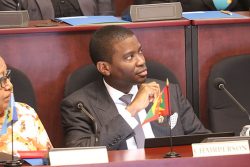UNITED NATIONS, (Reuters) – Bolivian President Evo Morales yesterday accused the World Bank of trying to “blackmail” his country several years ago by demanding free-market reforms in exchange for aid loans.
“In the first year of my government some World Bank representatives came to Bolivia and they tried to blackmail me,” Morales told reporters at U.N. headquarters, where he attended a General Assembly session that voted to establish an “International Mother Earth Day.”
“I said — OK, if it’s unconditional help, fine,” he said through an interpreter. “But if it’s conditioned on privatization of basic services, privatization of natural resources, then no.”
Morales, the country’s first Indian president and a fierce critic of the United States, said the World Bank has improved since that time by dropping such conditions on aid lending. He also expressed his support for a thorough reform of the International Monetary Fund.
“I welcome Brazil and Argentina’s proposal to radically reform the IMF and I also welcome the World Bank’s change of attitude,” he said.
Morales, who attended last weekend’s Summit of the Americas in Trinidad and Tobago, gave no details of the Brazilian and Argentine proposal for reforming the IMF. Brazil has called for emerging markets to have a greater voice inside the organization.
The Bolivian leader recalled a series of violent demonstrations that broke out in 2003 in South America’s poorest country after the government had raised taxes on gasoline and other items at the recommendation of the IMF in order to reduce its fiscal deficit.
“Our fiscal deficit did not improve and now … without this huge tax on petrol, we’re doing better,” he said.





